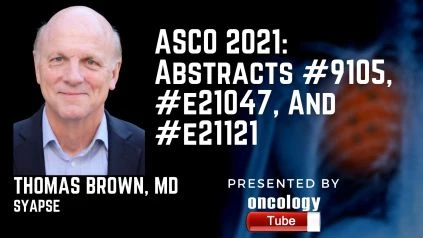Thomas Brown, MD, Chief Medical Officer, Syapse speaks about ASCO 2021 Abstracts – #9105 – Genomic markers associated with hyperprogression in patients with lung cancer treated with immune checkpoint inhibitors, #e21047 – Myocarditis as a rare, yet serious adverse event associated with immune checkpoint inhibitors in patients with non-small cell lung cancer: Case series from a large community-based cancer center, and #e21121 – Feasibility of RECIST-based real-world tumor response assessment in metastatic non-small cell lung cancer patients.
Link to Poster #9105:
https://meetinglibrary.asco.org/record/200547/abstract
Link to Abstract #e21047:
https://meetinglibrary.asco.org/record/200926/abstract
Link to Abstract #e21121:
https://meetinglibrary.asco.org/record/201064/abstract
#9105 Background:
Immune checkpoint inhibitor (ICI) therapy has become a standard of care for patients with non-small cell lung cancer (NSCLC). However, not all patients (pts) benefit with ICI, with a percentage reporting increased tumor development. Hyperprogression (HP) is a term used to describe faster tumor development on ICI along with the deteriorating clinical state. MDM2/MDM4 amplifications, EGFR alterations, and STK11/LKB1 mutations are some of the gene changes that have been linked to HP. HP was seen in 6/6 pts with MDM2/MDM4 amplification and 2/10 pts with EGFR changes, according to Kato et al. (doi: 10.1158/1078-0432.CCR-16-3133). HP in patients with NSCLC treated with ICIs in a big health system is described in this article.
#e21047 Background:
Immune checkpoint inhibitors (ICI) may cause immune-related adverse effects in patients with lung cancer and other malignancies (irAE). Pneumonitis, colitis, hepatitis, and myocarditis/pericarditis can all manifest with varying degrees of severity and single- or multi-organ involvement. Myocarditis occurs in 0.06 percent to 2.4 percent of the population and is associated with a significant death rate (25 percent to 50 percent ). Myocarditis is a high-grade adverse event in patients with lung cancer treated with ICIs is investigated in this retrospective evaluation of real-world data (RWD).
#e21121 Background:
The Response Evaluation Criteria in Solid Tumors (RECIST) is commonly used to assess treatment response to anti-cancer medicines for advanced lung cancer, however, it is not widely used in real-world settings. With real-world evidence increasingly being used to back promising treatments, this study looked into the feasibility of assessing real-world lung cancer response using RECIST-based measurement of lesions on archived radiologic films and comparing it to treatment response based on oncologist narratives in electronic health records (EHR).

